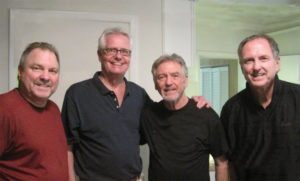There’s a little theater/showroom off the beaten path in Weirsdale, Florida, called the Orange Blossom Opry. It’s a small venue that hires a lot of union musicians, including many classic country artists who have had strings of hits throughout the years. Just recently Larry Gatlin and the Gatlin Brothers, members of Local 257 (Nashville, TN) were on the bill. Theater manager Suzanne Morgan arranged for me to get together with Larry before the Saturday matinee show.
Larry and his brothers, Steve and Rudy, have had a string of hits over the years, including “All the Gold in California,” “Houston (Means I’m One Day Closer to You),” “Broken Lady,” and many others. More than 50 years ago, the Gatlins started singing in their small hometown of Abilene, Texas, and they went on to have successful country music careers. Over the course of four-decades, the Gatlin Brothers have gone from dirty, dusty Texas stages to White House performances, from Broadway to the Grammy Awards and to the top of the country charts. When I asked Larry some questions about his career, I got some interesting answers.
I asked about some of their worst gigs. He says that playing the Jamboree in the Hills in Staunton, Virginia, when the temperature reached 148 degrees, was no picnic. A gig at the Atlanta Federal Penitentiary (as a performer, not an inmate) scared the hell out of him. As a young lad, he played a tent revival in Fort Worth, and was told he could have whatever was collected in an offering. The “love offering” amounted to $3.
The Gatlins were raised on gospel music, and began entertaining audiences in churches. They had guest appearances on radio and TV shows, when they were two, four, and six years old. Larry says their history as “gospel music junkies” came from those early roots.

A backstage chat with the Gatlin Brothers: (L to R) Rudy, Bob Popyk, Larry, and Steve, members of Local 257 (Nashville, TN).
“My folks took us to those old-fashioned Southern style quartet concerts, and it was love at first sound! My first hero was James Blackwood of the Blackwood Brothers Quartet. I just knew somehow, from that moment, that I wanted to be a singer for the rest of my life,” he says. The early ’70s found Steve and Rudy in college, while Larry moved to Nashville to write songs that were recorded by artists like Johnny Cash, Kris Kristofferson of Local 257, Barbra Streisand, Tom Jones, and Elvis Presley.
Larry and his brothers have played for five of the last seven presidents. Larry has stayed overnight at the White House in the Lincoln Bedroom. He recalls that he and his wife retired early there one night. They were in bed, with their clothes off, when George Bush came knocking at the door, wanting to show them some artifacts in the historic room. (Larry said that it wasn’t an opportune time, but he let the President in anyway.)
Gatlin is proud to be an AFM member. He says “at this stage of his life” he gets a check every month. Being a union member, he “knows he doesn’t have to play with crappy musicians.”
In Nashville, he became friends with former Local 257 President Harold Bradley. As Larry puts it, Bradley is “a true Southern gentleman, a consummate musician, and a great guitar player, who can read charts like crazy.” He credits Bradley for helping him turn his life around when things weren’t going quite so well. To this day, Larry says he has the utmost appreciation and deepest respect for Harold.
At this stage in their careers, the Gatlin’s have the best of both worlds, families and fans, and plenty of work both as individuals and together. You can tell they love to sing together. I think there’s no harmony quite as pure as family harmony.
I enjoyed meeting Larry, and his brothers. I stayed for the Gatlin Brothers show. Their music certainly screams of love and a lot of living. It’s Americana at its best and their fans love it. They represent the true spirit of the AFM.

